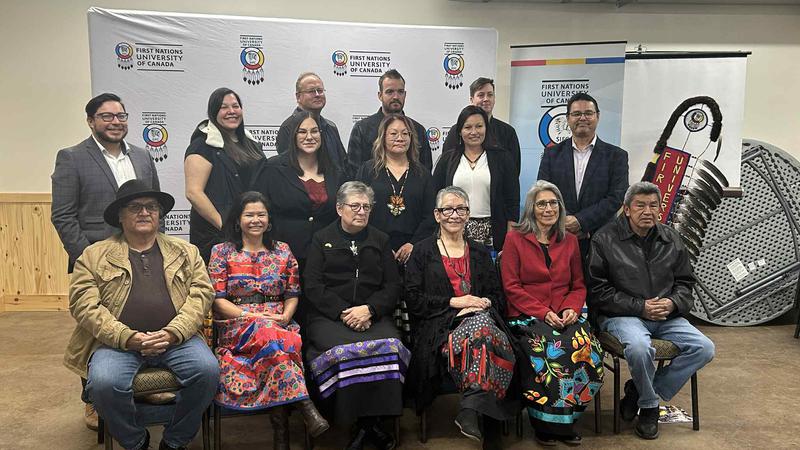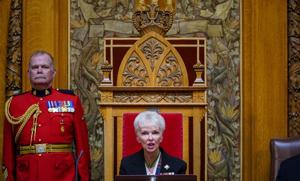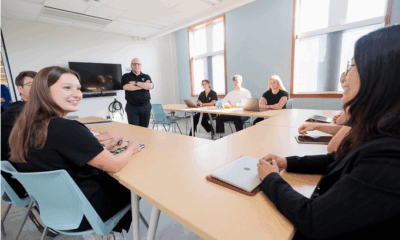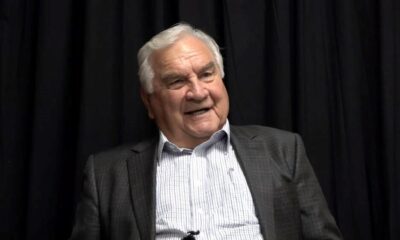Education
FNUniv Upgrades Traditional Campus to Enhance Indigenous Learning

The First Nations University of Canada (FNUniv) recently celebrated significant upgrades to its nēwoskan Traditional Campus, located approximately 30 kilometers south of Prince Albert, Saskatchewan. This 22-acre site along the South Saskatchewan River serves as a vital land-based learning environment for students, Elders, and Knowledge Keepers, emphasizing Indigenous social work, education, and cultural practices.
On October 22, 2025, FNUniv president Jacqueline Ottmann highlighted the spiritual significance of the land during the renewal celebration. “This location is very important for the university, and, of course, it has to do with the spiritual connection,” she stated. The campus, which has been in use since 2021, represents the university’s fourth campus and facilitates various educational activities, including language culture camps, ceremonies, and traditional teachings.
The upgrades to the campus totaled $3.4 million, with FNUniv contributing $1 million and the federal and provincial governments investing $2.4 million through the Canada Infrastructure Program. Key improvements include renovations to the mess hall, installation of a kitchen, enhancements to water and wastewater infrastructure, addition of showers, air conditioning units, and an enclosed sweat lodge.
Ottmann emphasized the enriching experiences the campus offers. “This land provides students opportunities to learn from the environment, to disconnect from the cities, to engage in meaningful ways with each other, to listen to the coyotes at night, to see the brilliance of the stars, and to be open to healing in various ways,” she noted. This focus on healing is integral to nurturing Indigenous identities and ways of knowing, being, and doing.
Emphasis on Indigenous Learning and Sustainability
While the educational framework at the nēwoskan Traditional Campus is rooted in Indigenous traditions, it also includes lessons on environmental stewardship and sustainability. Ottmann pointed out that the natural setting helps students eliminate distractions that may hinder deeper learning experiences. “First Nations University represents a decolonized approach to teaching, learning, and research,” she explained.
This philosophy enables students to engage in traditional practices freely, including rituals such as lifting the pipe, which symbolizes a step toward healing from historical injustices faced by Indigenous peoples. Quoting Murray Sinclair, a prominent Indigenous leader, Ottmann reflected, “Education got us into this mess, and it should get us out,” reinforcing the university’s mission to empower students through culturally relevant education.
The upgrades to the nēwoskan Traditional Campus mark a commitment to enhancing educational opportunities for Indigenous students. By creating a dedicated space for land-based learning, FNUniv reinforces the importance of culturally responsive education and continues to foster a sense of community and belonging among its students and faculty. This initiative not only strengthens academic ties to Indigenous cultures but also promotes environmental consciousness, making it a pivotal development for the university and its community.
-

 World3 months ago
World3 months agoScientists Unearth Ancient Antarctic Ice to Unlock Climate Secrets
-

 Entertainment3 months ago
Entertainment3 months agoTrump and McCormick to Announce $70 Billion Energy Investments
-

 Lifestyle3 months ago
Lifestyle3 months agoTransLink Launches Food Truck Program to Boost Revenue in Vancouver
-

 Science3 months ago
Science3 months agoFour Astronauts Return to Earth After International Space Station Mission
-

 Technology2 months ago
Technology2 months agoApple Notes Enhances Functionality with Markdown Support in macOS 26
-

 Top Stories2 weeks ago
Top Stories2 weeks agoUrgent Update: Fatal Crash on Highway 99 Claims Life of Pitt Meadows Man
-

 Sports3 months ago
Sports3 months agoSearch Underway for Missing Hunter Amid Hokkaido Bear Emergency
-

 Politics3 months ago
Politics3 months agoUkrainian Tennis Star Elina Svitolina Faces Death Threats Online
-

 Technology3 months ago
Technology3 months agoFrosthaven Launches Early Access on July 31, 2025
-

 Politics3 months ago
Politics3 months agoCarney Engages First Nations Leaders at Development Law Summit
-

 Entertainment3 months ago
Entertainment3 months agoCalgary Theatre Troupe Revives Magic at Winnipeg Fringe Festival
-

 Politics2 weeks ago
Politics2 weeks agoShutdown Reflects Democratic Struggles Amid Economic Concerns





















